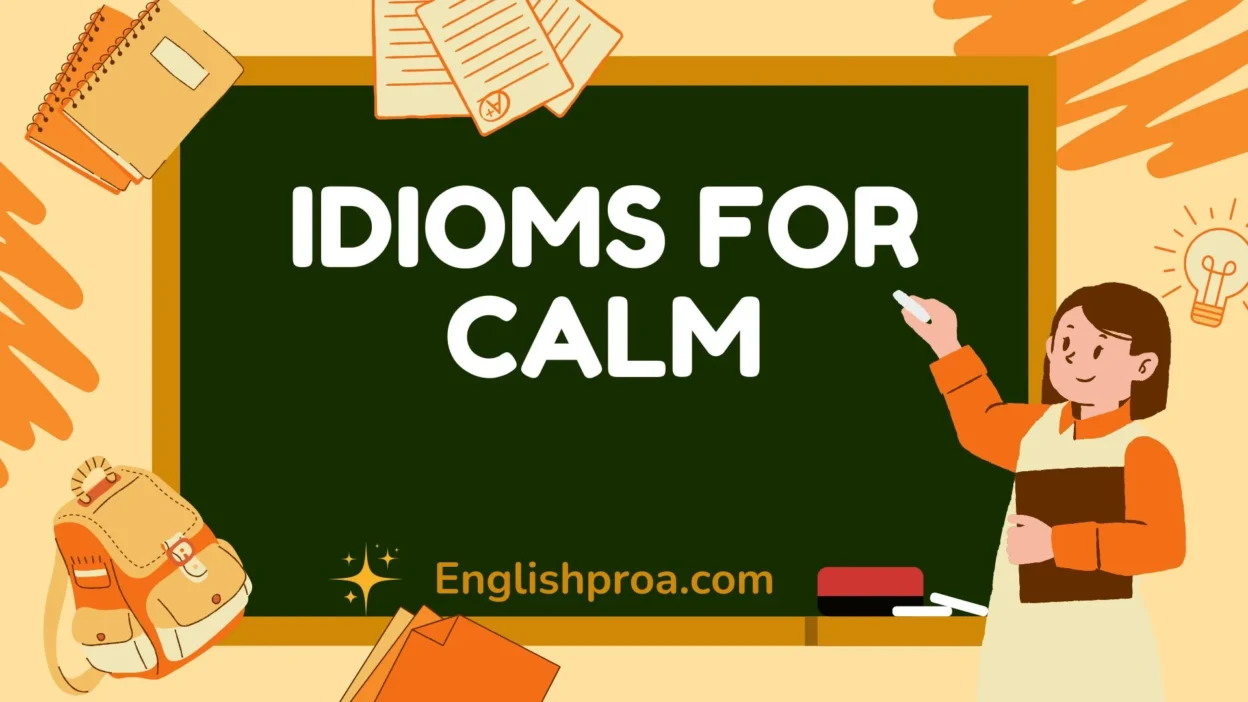Calm is a state of peace we all seek, especially in today’s fast-moving, noisy world. Whether you’re trying to comfort a friend, center yourself during chaos, or express a moment of peace in your writing, having the right words makes all the difference. In this blog post, I’ll walk you through 30 heartfelt idioms that express calm in beautifully nuanced, warm, and thoughtful ways.
I’ve used many of these idioms in my own life—whether guiding someone through a stormy situation or writing to soothe someone’s mind. These idioms don’t just describe serenity—they help create it.
Let’s explore expressions that gently wrap around your heart like a soft blanket, giving you language to soothe, connect, and express tranquility with depth and kindness.
1. As cool as a cucumber
Meaning: Completely calm and composed, especially in a tense situation.
In a sentence: Even during the emergency, she stayed as cool as a cucumber.
Best use: Comforting someone after they’ve handled stress well.
Not use: In deeply emotional or tragic contexts.
Other ways to say: Unshaken, composed, emotionally grounded
2. Keep your cool
Meaning: Stay calm under pressure or provocation.
In a sentence: Despite the accusations, he managed to keep his cool.
Best use: Handling conflicts, especially verbal ones.
Not use: When emotions should be expressed.
Other ways to say: Stay composed, maintain your peace
3. Calm before the storm
Meaning: A peaceful moment before chaos or conflict begins.
In a sentence: The quiet morning felt like the calm before the storm.
Best use: Setting a scene, foreshadowing.
Not use: When nothing disruptive is expected.
Other ways to say: Moment of peace, temporary quiet
4. At peace
Meaning: Feeling content and calm internally.
In a sentence: After moving to the countryside, she finally felt at peace.
Best use: Reflecting on emotions, personal growth.
Not use: In high-energy or humorous settings.
Other ways to say: Centered, grounded, tranquil
5. Let it slide
Meaning: To not react negatively to a minor annoyance.
In a sentence: He made a rude remark, but I chose to let it slide.
Best use: Managing small conflicts with maturity.
Not use: When serious boundaries are crossed.
Other ways to say: Brush it off, overlook, let go
6. Still waters run deep
Meaning: Quiet people often have deep, thoughtful minds.
In a sentence: She doesn’t speak much, but still waters run deep.
Best use: Appreciating quiet personalities.
Not use: Describing situations, not people.
Other ways to say: Quiet strength, inner depth
7. Go with the flow
Meaning: Adapt easily to changes or unexpected events.
In a sentence: On vacation, I just go with the flow.
Best use: Emphasizing flexibility.
Not use: When firmness is required.
Other ways to say: Adapt, roll with it, be easygoing
8. Take it easy
Meaning: Relax and avoid stress.
In a sentence: You’ve been working hard—take it easy this weekend.
Best use: Suggesting rest and care.
Not use: In emergency or urgency.
Other ways to say: Rest up, chill out, unwind
9. In the zone
Meaning: Calmly focused and deeply immersed.
In a sentence: When I’m writing, I’m completely in the zone.
Best use: Describing creative or athletic flow.
Not use: Describing emotional calm.
Other ways to say: In sync, fully present, focused
10. Hold your horses
Meaning: Calm down and wait patiently.
In a sentence: Hold your horses—we’ll get there soon.
Best use: Light-hearted situations with impatience.
Not use: Formal or serious settings.
Other ways to say: Be patient, wait a bit, ease up
11. In good hands
Meaning: Being cared for by someone capable.
In a sentence: Don’t worry—your child is in good hands.
Best use: Reassuring someone.
Not use: If trust hasn’t been earned.
Other ways to say: Safe, supported, protected
12. Like water off a duck’s back
Meaning: Remaining unaffected by criticism or stress.
In a sentence: Insults roll off her like water off a duck’s back.
Best use: Describing resilience.
Not use: When criticism does affect someone.
Other ways to say: Unbothered, unfazed
13. Lighten up
Meaning: Relax your mood or attitude.
In a sentence: You’re taking this too seriously—lighten up!
Best use: Friendly nudge toward calm.
Not use: When someone is grieving or upset.
Other ways to say: Loosen up, ease off
14. Chill out
Meaning: Calm down, especially after being agitated.
In a sentence: He was furious, but I told him to chill out.
Best use: Informal calming advice.
Not use: In serious or emotional moments.
Other ways to say: Cool down, take a breather
15. Keep it together
Meaning: Stay emotionally composed.
In a sentence: She barely kept it together during the goodbye.
Best use: Under emotional stress.
Not use: When falling apart is okay.
Other ways to say: Stay composed, stay strong
16. Sit tight
Meaning: Wait patiently and calmly.
In a sentence: We’re sorting it out—sit tight.
Best use: Reassurance during delays.
Not use: When urgency is required.
Other ways to say: Hang on, wait calmly
17. Easy does it
Meaning: Proceed gently and calmly.
In a sentence: Easy does it—lift that slowly.
Best use: Careful physical or emotional movement.
Not use: In fast-paced actions.
Other ways to say: Take it slow, be gentle
18. Take a deep breath
Meaning: Calm down and reset your emotions.
In a sentence: Before the speech, I took a deep breath.
Best use: Preparing emotionally.
Not use: When breathing is already labored (literal).
Other ways to say: Pause, ground yourself
19. Not a care in the world
Meaning: Totally relaxed and stress-free.
In a sentence: The kids played with not a care in the world.
Best use: Describing pure contentment.
Not use: In serious or responsible contexts.
Other ways to say: Free-spirited, carefree
20. Keep a level head
Meaning: Remain calm and sensible in difficult situations.
In a sentence: Amid the chaos, she kept a level head.
Best use: Complimenting someone’s maturity.
Not use: In emotionally expressive moments.
Other ways to say: Stay rational, keep perspective
21. Breathe easy
Meaning: Feel relieved and calm again.
In a sentence: Once the test was over, I could finally breathe easy.
Best use: After anxiety passes.
Not use: During active panic.
Other ways to say: Relax, let go of stress
22. Smooth sailing
Meaning: Things going calmly and easily.
In a sentence: After the repairs, it was smooth sailing.
Best use: Describing ease after difficulty.
Not use: If ongoing issues exist.
Other ways to say: Going well, trouble-free
23. Peace of mind
Meaning: A state of mental and emotional calm.
In a sentence: Getting insurance gave me peace of mind.
Best use: Security, reassurance.
Not use: In spontaneous moments.
Other ways to say: Mental ease, sense of safety
24. All in stride
Meaning: Accepting difficulties calmly.
In a sentence: She took the criticism all in stride.
Best use: Showing grace under pressure.
Not use: When emotions should be addressed.
Other ways to say: Roll with it, take it calmly
25. Cool-headed
Meaning: Thinking clearly without panic.
In a sentence: His cool-headed thinking saved the day.
Best use: In crisis management.
Not use: Describing overly emotional moments.
Other ways to say: Rational, calm, collected
26. Mind like water
Meaning: A calm mind that responds rather than reacts.
In a sentence: In meditation, I seek a mind like water.
Best use: Personal growth, mindfulness.
Not use: In aggressive contexts.
Other ways to say: Balanced, present, serene
27. Tame the storm
Meaning: Calm down a chaotic situation.
In a sentence: Her words tamed the storm in the room.
Best use: Emotional or group conflict.
Not use: When no conflict exists.
Other ways to say: Settle things, calm the chaos
28. In one’s element
Meaning: Calmly thriving in a familiar or comfortable setting.
In a sentence: In the kitchen, he’s in his element.
Best use: Confidence and ease.
Not use: In discomfort or unfamiliarity.
Other ways to say: Comfort zone, natural habitat
29. Flow like a river
Meaning: Moving calmly and naturally through life.
In a sentence: She taught me to flow like a river through changes.
Best use: Inspirational, spiritual tone.
Not use: In analytical discussions.
Other ways to say: Move with grace, adapt gently
30. A sea of calm
Meaning: A powerful, deep sense of peace.
In a sentence: His presence was a sea of calm in the chaos.
Best use: Describing emotional anchors.
Not use: In light-hearted banter.
Other ways to say: Deep peace, grounding calmness
Frequently Asked Questions (FAQs)
Q1: Why are idioms important for expressing calm?
Idioms offer emotionally rich ways to communicate subtle feelings like serenity, peace, or quiet strength.
Q2: Can these idioms be used in professional writing?
Yes, but choose those that match the tone—like “keep a level head” or “peace of mind” for formal writing.
Q3: Are these idioms suitable for teaching kids calm behavior?
Absolutely. Phrases like “take it easy” or “go with the flow” are simple, kind, and easy for children to grasp.
Q4: How can I remember these idioms better?
Use them regularly in journaling, conversations, or even social media captions to anchor them in memory.
Q5: What if I use an idiom in the wrong context?
It happens! Just pay attention to tone. Over time, you’ll develop a natural feel for when they fit best.
Conclusion
Calm isn’t just a feeling—it’s a way of being, and the words we choose can guide ourselves and others toward that state. Whether you’re comforting a friend, narrating a peaceful moment, or practicing self-care, these 30 idioms for calm can help you communicate in a way that feels genuine, kind, and emotionally intelligent.
From personal experience, I’ve found that having the right language softens even the roughest storms. These idioms aren’t just expressions—they’re tools to soothe, connect, and bring peace into our conversations.





